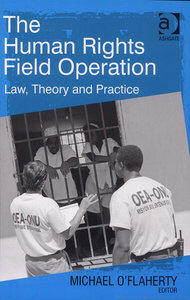Blasphemy Laws and Memory Laws Condemned by the Michael O'Flaherty, Member of the Human Rights Committee, United Nations
A UN Human Rights Commission summary at the end of July 2011 reaffirms that "Holocaust Denial" is a protected Human Right!
 28
July 2011 - The United Nations Human Rights Committee has issued a
commentary on freedom of expression that says anti-blasphemy laws
and restrictions on criticisms of governments are incompatible with
existing norms. Free expression is essential for the
protection of human rights.
28
July 2011 - The United Nations Human Rights Committee has issued a
commentary on freedom of expression that says anti-blasphemy laws
and restrictions on criticisms of governments are incompatible with
existing norms. Free expression is essential for the
protection of human rights.
O'Flaherty was 'rapporteur' (principal drafter) for the Human Rights Committee's General Comment No. 34 on Article 19 of ICCPR, finally adopted on 21 July 2011 after two years of negotiation. This major re-statement of the international law on freedom of expression emphasizes the importance of media freedoms and it sets out the extent to which human rights standards relate to the new media and information platforms.
The Office of the High Commissioner for Human Rights published its report entitled "General Comment" today, with an interpretation of the 1966 International Covenant of Civil and Political Rights which has 167 States parties.
 Michael
O'Flaherty is the author of "The Human Rights Field Operation, Law,
Theory and Practice.
Michael
O'Flaherty is the author of "The Human Rights Field Operation, Law,
Theory and Practice.
The committee said that so-called "memory laws," which it defined as "laws that penalize the expression of opinions about historical facts," are also "incompatible with the obligations that the covenant imposes on States parties in relation to the respect for freedom of opinion and expression."
"Freedom of expression is a necessary condition for the realization of the principles of transparency and accountability that are, in turn, essential for the promotion and protection of humans rights," the report said.
49. Laws that penalise the expression of opinions about historical facts* are incompatible with the obligations that the Covenant imposes on States parties in relation to the respect for freedom of opinion and expression. The Covenant does not permit general prohibition of expressions of an erroneous opinion or an incorrect interpretation of past events. Restrictions on the right of freedom of opinion should never be imposed and, with regard to freedom of expression they should not go beyond what is permitted in paragraph 3 or required under article 20.
*So called “memory laws” see Faurisson v. France, No. 550/93.
In 1991, Faurisson was removed from his university chair on
the basis of his views under the
Gayssot Act, a French statute passed in 1990 that prohibited
Holocaust denial. He challenged the statute as a violation of
international law at the
International Covenant on Civil and Political Rights and
Human Rights Committee. The Human Rights Committee upheld the
Gayssot Act as necessary to counter possible antisemitism. Further
trials followed, among them one in connection with a publication on
the website of the "Association des anciens amateurs de récits de
guerre et d'Holocauste" (AAARGH)
in 1998, of which he was absolved due to lack of evidence of his
authorship.

"States parties should put in place effective measures to protect against attacks aimed at silencing those exercising their right to freedom of expression." - Comment No. 34
